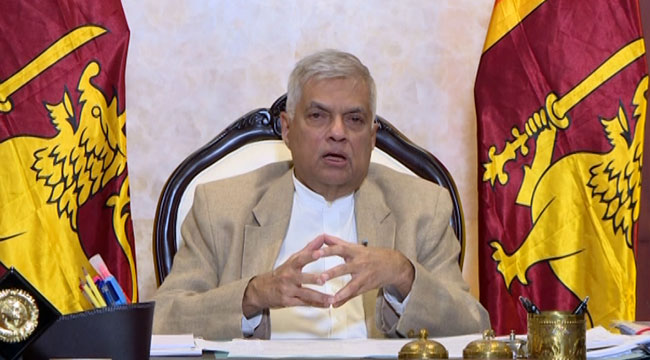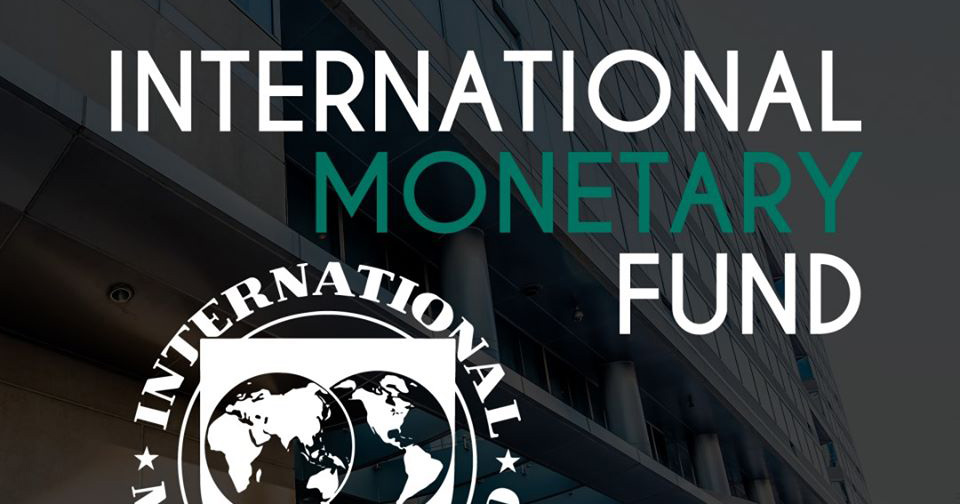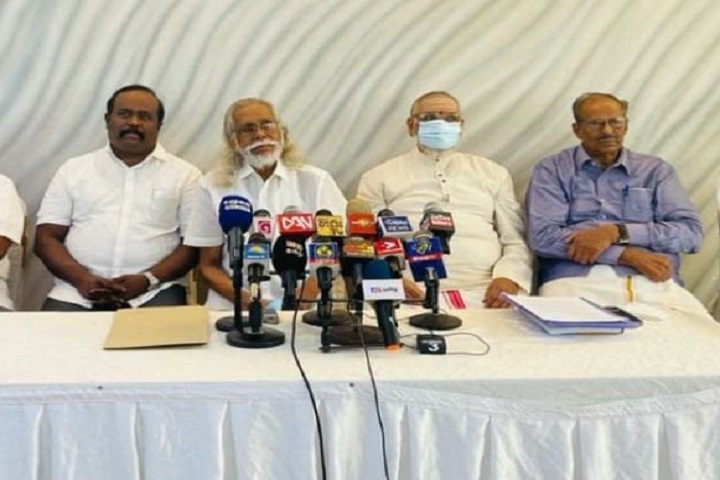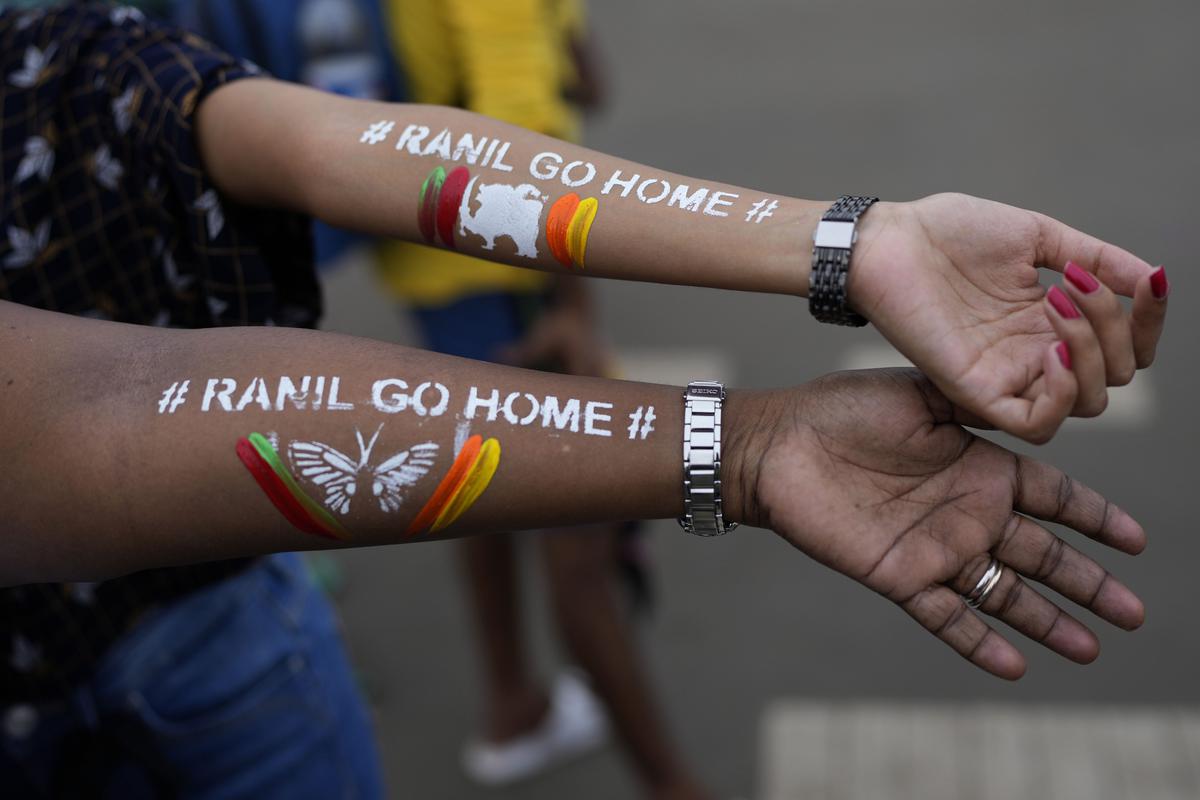Gathered outside the Presidential offices, still under the control of a small band of protesters – with the entrance hall turned into a community library – a number of activists watched a live stream from Sri Lanka’s parliament on their phones as Ranil Wickremesinghe was selected as the island’s new leader.
On the steps, a small group began chanting “Ranil Go Home” but the reigning mood was one of disappointment and resignation rather than overwhelming outrage.
Protest leaders had vowed not to accept Mr Wickremesinghe as president, dismissing him as too close an ally of the ousted former President Gotabaya Rajapaksa, blamed for the dire economic crisis currently engulfing Sri Lanka.
Mr Wickremesinghe had been serving as Prime Minister since May.
During huge, unprecedented protests earlier this month, massive, angry crowds took over his official residence and offices, whilst others set fire to his family home.
The same protests also targeted Mr Rajapaksa, forcing him to flee the country and then resign, with Mr Wickremesinghe taking over as acting president.
Today 134 members of Sri Lanka’s parliament voted for him to take over permanently – his closest rival received 82 votes.
Nuzly Hameem, a leading activist from the protest movement, told the BBC, “people are burnt out after four months of continuous protest.”
Nonetheless he listed a series of demands that have been laid out, including changes to the constitution and decreasing the power of the president, as well as calling fresh elections within a year after providing “relief” to the people.
Many in the movement appeared unnerved by the speed at which it had grown and the street power it had accumulated, worried about the possibility of violence.
Last week, they handed back control of the official buildings, barring the President’s Secretariat, next door to the main protest camp on a seaside strip known as Galle Face.
Mr Hameem said he was disappointed the country had to “settle” for Mr Wickremesinghe, despite having successfully ousted his powerful predecessor, but added, “when an election comes, people will have a sense of how to vote next time.”
Mr Wickremesinghe has served as Prime Minister on six previous occasions, though he never completed a term and is regarded as having long desired to become president.
Now finally in office, however, he will face unenviable challenges.
Sri Lanka’s economy remains in a deep crisis.
A series of disastrous policy decisions, coupled with the after effects of the Covid-19 pandemic means the country’s foreign reserves have all but run out, leaving the government unable to afford to import enough fuel or medicine, while food prices have soared.
There are queues at petrol stations stretching for miles, with drivers often sleeping in their cars for more than a week to get to the front.
Last month inflation was measured at more than 50%, but at a market in the capital Colombo, stallholders said the price of most items had doubled or tripled since last year.
Padma Kanthi, a mother of three, whose husband works as a labourer, wells up with tears as she describes her daily struggle.
“Everything is so expensive, my children ask me for milk in the morning but I can’t afford it, ” she says. “I feel so bad… the electricity in our home has been cut off because we couldn’t pay the bills.”
With long queues for gas cylinders, and steep rises in its cost, alongside fruit and vegetables it’s become common to see small bundles of firewood for sale in Sri Lanka’s markets, with some families forced to light fires in order to cook their meals.
Jayanthi Karunarathne cares for her two grandchildren, one of whom has learning difficulties.
“We’ve been using firewood for the past three months,” she says, “I got gas and kerosene once by queuing up, but after that I couldn’t get it at all.”
Some have had to cut down the number of meals they eat.
With the help of family and friends, Ms Karunarathne, who works as a dressmaker, still manages to provide three meals a day for her grandsons, but she’s reduced the amount she cooks.
“We never expected this to happen, we own our own house,” she told the BBC, speaking from her small patio lined with flower pots.
“I’ve never had to live like this before, but now I have to for the sake of my grandchildren, it’s hard.”
The Sri Lankan government is in talks about restructuring its debts to foreign countries, and is also discussing a bailout deal with the International Monetary Fund, but that would likely entail tax rises and reduced public spending.
Further political instability would make those negotiations even more challenging, but many involved in the protests feel real “change” can only happen when those linked to the current crisis are replaced.
Waiting in a queue for fuel, stretching for miles along a main road facing the ocean, some drivers were hopeful that Mr Wickremesinghe’s political experience meant he would be best placed to guide the country going forwards.
Others were furious. “These people have been ruling for the past 70-odd years, they have been stealing, how can we expect good things to happen?!” asked Anil, a retired truck driver indignantly.
“We should beat them and throw them out… If we want change we need new faces.”
Further down the queue, Mukesh, a Tuktuk driver, says wistfully, “we don’t want change, we just want our country to go back to what it was before all this.”
Source: BBC News











